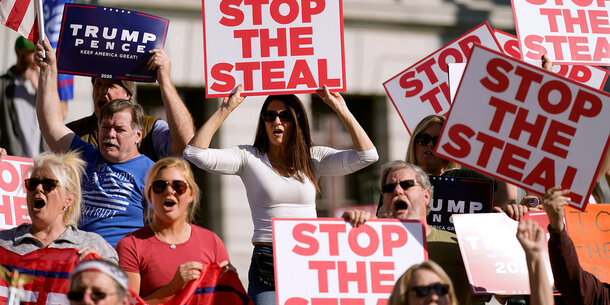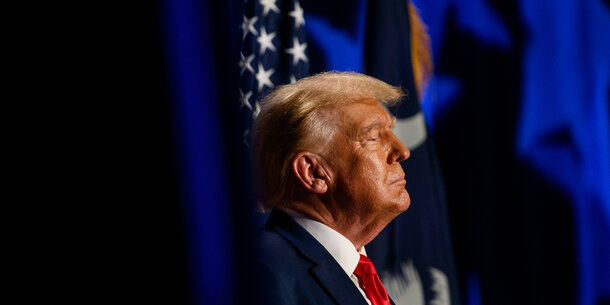The U.S. Supreme Court is just days away from hearing oral arguments in Moore v. Harper, a redistricting case out of North Carolina that could have disastrous consequences for our elections. The Court will decide whether the state’s high court went against the U.S. Constitution by striking down a legislatively drawn congressional map for violating North Carolina’s constitution. Some state legislators argue their gerrymandered map should be reinstated because the so-called “independent state legislature theory” grants state legislatures near-absolute power over federal elections, negating the traditional checks and balances offered by state courts, state constitutions, governors, and even the people themselves.
The case has attracted nearly 70 amicus (or “friend of the court”) briefs, which are meant to offer new information and perspectives to aid the Court’s deliberations. In this instance, two-thirds of the amici urge the justices to reject the independent state legislature theory.
[For a full list of the amicus briefs in Moore v. Harper, see our annotated guide.]
Forty-eight of the amicus briefs support the voters and nonprofits challenging the theory, while sixteen back the state legislators urging the Court to embrace it. Five briefs side with neither party but nevertheless offer important takes on the risks the theory poses. A high-level look at the members of each camp and their perspectives on the case highlights several of the many reasons the Court should reject this radical, unfounded, and dangerous theory.
Opposition to the independent state legislature theory is bipartisan
Dozens of prominent conservative figures — including high-ranking federal and state officials, judges, and attorneys — have denounced the theory. Among the most significant names on the roster of filers: Federalist Society cofounder Steven Calabresi, highly respected former federal circuit judge Thomas Griffith, former California Gov. Arnold Schwarzenegger, a group of prominent former Republican election officials, and even Republican election lawyer Ben Ginsberg, who worked on the Bush v. Gore case that planted the seeds of the theory.
The Conference of Chief Justices, representing the chief justices of the highest courts in all 50 states, also joined the chorus of opposition. The Conference is greatly respected on matters concerning the state judiciary. Because it rarely files at the Court and it represents justices appointed by members of both political parties, its voice carries special weight. Although its brief didn’t formally support either party in the case, it meticulously dissected the theory’s lack of historical support and its conflicts with Supreme Court precedent.
Another significant challenger of the theory is esteemed conservative jurist and former federal circuit judge J. Michael Luttig, who is serving as party counsel for some of the voters and nonprofits in the case.
Considering the increasingly polarized nature of U.S. politics, the massive, bipartisan resistance to the independent state legislature theory is noteworthy.
Supporters of the independent state legislature theory are a small camp with some dubious members
In addition to a who’s who of conservative figures, the extensive list of the theory’s critics includes current and former elected and executive branch officials, election officials from every level of state government, four-star generals and admirals, historians, law professors, civil rights organizations, good government groups, and think tanks.
The size and diversity of the opposing camp stand in sharp contrast to the theory’s supporters. This small group is made up of state attorneys general, think tanks and litigation shops, and partisan political organizations. As noted in a brief by Sen. Sheldon Whitehouse (D-RI) and Rep. Hank Johnson (D-GA), a number of the theory’s proponents are linked to election denial and voter suppression. They include John Eastman, who advised Donald Trump in his antidemocratic attempts to retain power after losing the 2020 election.
Experts side against the independent state legislature theory
The theory’s proponents make a lot of claims about the historical record. But none are historians. Actual historians universally concur that the theory is flat-out wrong. For example, some of the top scholars of the Founding Era and state constitutional law thoroughly debunked it, explaining that there is “no evidence that anyone at the time” shared the North Carolina legislators’ interpretation of the constitutional clause under debate. The legislators’ view is particularly questionable in light of the Framers’ well-documented wariness toward unchecked power and state legislatures. What’s more, the legislators’ case for the theory relies in part on a fake document.
History aside, several groups of secretaries of state and other election officials submitted briefs that paint a damning picture of the chaos the theory would create if put into practice today. It would create an unworkable “two-track” election system with different rules for state and federal elections, even if those elections were being held on the same day in the same place. Additionally, the theory would deprive election officials of the discretion they need to resolve all sorts of issues that legislatures never could or would handle, including Election Day emergencies. No election officials chimed in to support the theory, and the only one to file in support of neither party — Missouri Secretary of State John Ashcroft — argued that the theory doesn’t apply in this case.
The independent state legislature theory threatens major harm — for no good reason
The theory’s detractors go into exhaustive detail about its practical pitfalls. Giving state legislatures unfettered control over federal elections would adversely impact election administration, election litigation, federal courts’ docket management, and the public’s perception of elections’ legitimacy, to name a few. Moreover, the theory could nullify huge swaths of state laws that apply to federal elections. The Brennan Center’s brief gives detailed insight into at least 170 constitutional provisions, 650 statutory delegations of power, and thousands of policies that could be at risk, ranging from rules about voter registration to polling place sites to vote-counting procedures.
Given how apparent the theory’s harms are, one might imagine its supporters would offer an incredibly convincing argument for why it should be adopted anyway. But this is not the case. The North Carolina legislators and amici alike never explain why, as a practical matter, anyone — the Framers, today’s Americans, or the Supreme Court — would want what the theory offers. Instead, its proponents attempt to dismiss concerns about the theory as liberal hysteria.
But briefs by filers across the ideological spectrum agree that the independent state legislature theory would destabilize our long-standing approach to election administration, destroy our 200-year-old system of checks and balances, and ultimately undermine Americans’ trust in the integrity and legitimacy of our elections.
The friends of the court have spoken, and the vast majority are saying the same thing. It’s up to the Supreme Court to listen.




